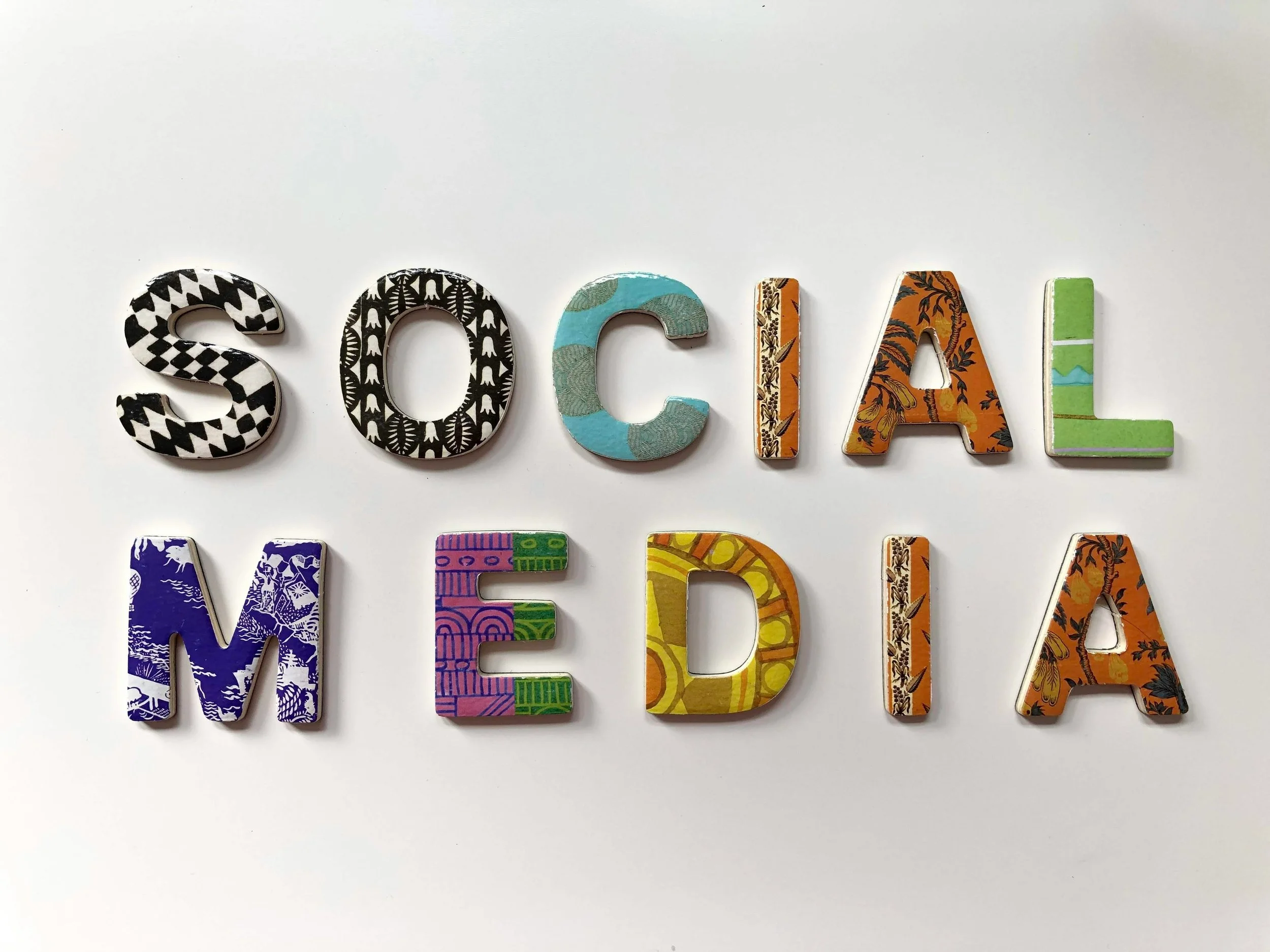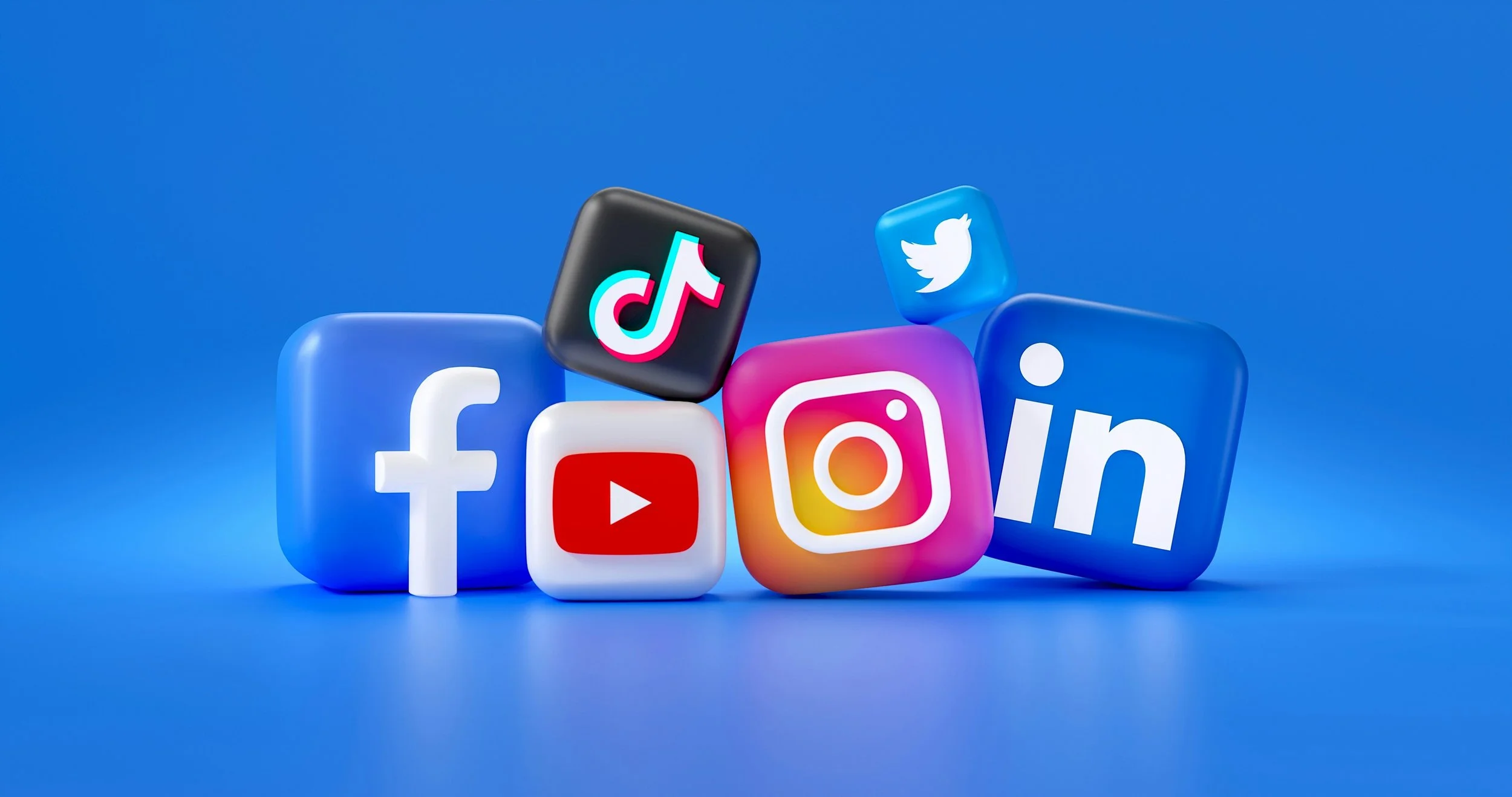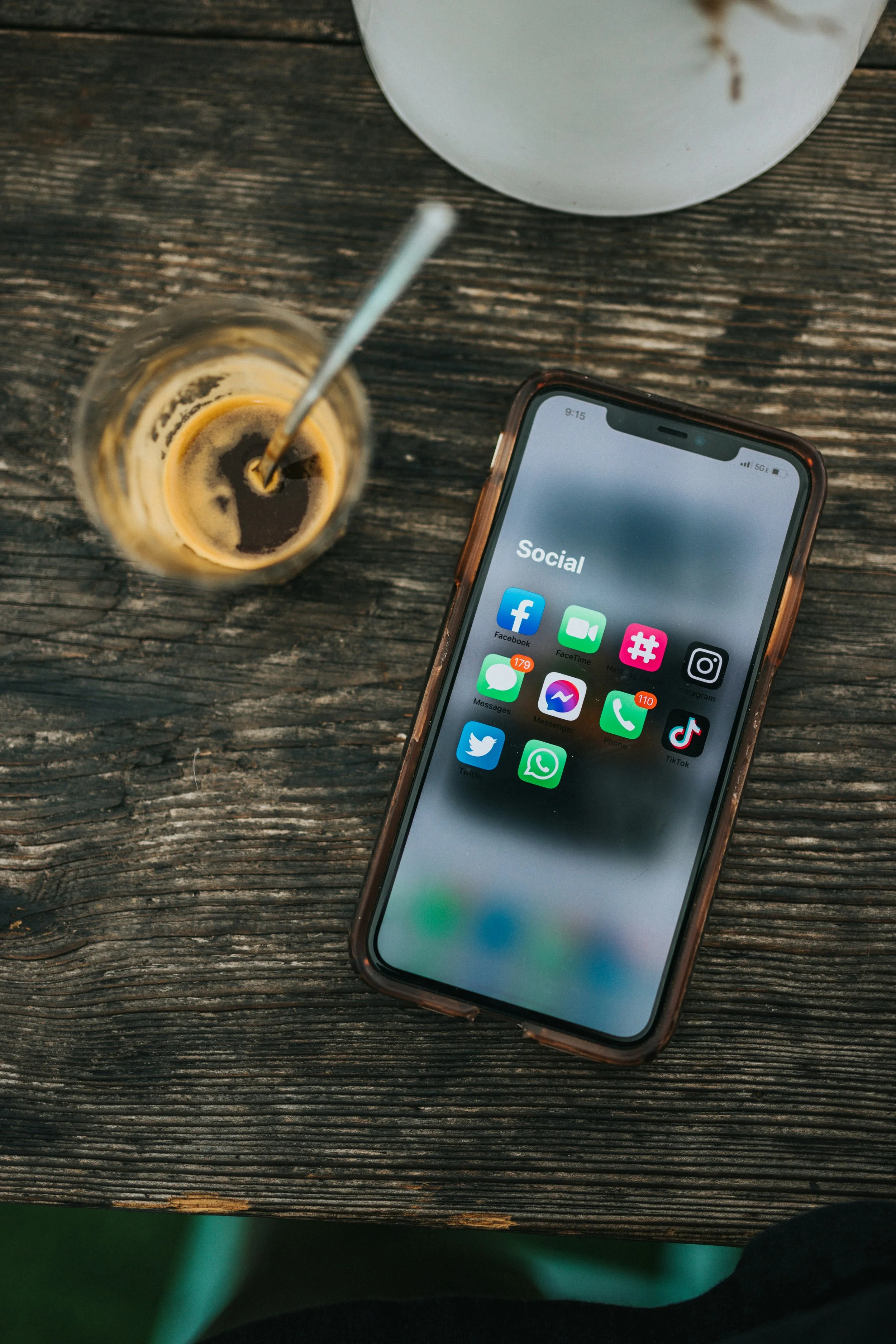Look around almost anywhere and you’ll see most people with their heads bent over their phones. Leaving aside neck strain issues - which are becoming more and more common! - what is everyone so busy doing on these small devices? While we use our phones for keeping in touch with real life family and friends, work, emails, internet searches, maps and taking photos, around 65% of the world's population also use some form of social media. The entertainment, the novelty and the endless scroll keep our eyes glued to the bright screens of our handheld devices.
Over the last 20 years, there has been a seismic shift from mostly in-real-life connection between humans, to potentially infinite online contact. Nearly 5.5 billion people communicate with each other in the ether, in contrast to centuries of human existence where each individual knew only those in their immediate community.
There’s a lot of debate and discussion about social media at the moment - is it good for us? Is it rotting our brains? Should it have age restrictions in the same way that alcohol and gambling do? Is it really possible to find a way to use social media that supports our lives and doesn’t have any negative impacts?
In this blog, we’re going to discuss this essential, topical subject. We’re going to have a look at:
what is social media
pros and cons of social media
particular dangers and concerns about the impact of social media
Let’s jump in!
‘Social media is the ultimate equaliser. It gives a voice and a platform to anyone willing to engage.’ - Amy Jo Martin
What is social media?
The Cambridge Dictionary definition of ‘social media’ is:
‘websites and computer programs that allow people to communicate and share information, opinions, pictures, videos, etc. on the internet, especially social networking websites.’
Early social networking sites were operating in the mid-1990s, evolving to platforms like MySpace and LinkedIn from the early 2000s. But it wasn’t until the popular availability of smartphones and other mobile devices from the late 2000s onwards that social media as we know it today began to develop. This also coincided with the invention of ‘infinite scroll’, which meant that instead of clicking through pages of paginated content as we did before, endless feeds of content now load automatically as you swipe up.
We now have a plethora of social media apps to choose from, depending on what we wish to engage with. Social media covers a broad spectrum of services, including business networking, social networking, video sharing, photo sharing, forums and social gaming. According to YouGov polls, the twenty most popular social media platforms in the UK in 2025 are:
Youtube
WhatsApp
Facebook
Instagram
iMessage
Reddit
Pinterest
TikTok
LinkedIn
X
Discord
Snapchat
GoodReads
Bluesky
Twitch
Myspace
Telegram
Threads
Nextdoor
Tumblr
You probably have access to a few of these!
Most social media platforms require the users to be 13 years old or over to open an account. However, this age restriction has more to do with the legal use of data without parental consent than it has to do with any proper assessment of children’s safety or mental health when using social media. There is no real basis for young people over the age of 13 being ‘ready’ for ‘internet adulthood’. And it’s also extremely easy for children under the age of 13 to open social media accounts by entering fake details.
This is just one of the reasons why some countries are looking at how they might put in place legal restrictions for social media for teenagers. Australia has now banned social media for under-16s, for example. Let’s have a look at the pros and cons of social media to understand what’s behind these legislative moves.
‘Social media is a boon for businessmen; curse for kids.’ - Amit Kalantri
Pros and cons
Like all technology, social media involves a complex combination of positive and negative elements. The following are just some of the potential benefits and drawbacks of social media. Can you think of any more?
Pros
Connection - social media provides limitless opportunities to connect with like-minded people. You can find people who are just like you, which is helpful if you don’t know anyone in real life who shares your particular circumstances, interests or challenges.
Broaden your perspective - online, you can connect with people from other backgrounds, cultures and social classes. This helps you to become more open-minded, tolerant and empathetic.
Education - you can learn just about anything from social media these days. If you’re wondering how to do any task, chances are someone has already made a Youtube video about it!
Entertainment - a lot of things on social media are very funny and entertaining, and you can find things that suit your interests and sense of humour.
Inspiration - be inspired to travel, learn, develop your skills, watch other people’s journeys through life and much, much more!
Easier conversations - you don’t have to wait your turn to speak, or be overshadowed by more extroverted, confident people, and you can think more carefully about what you want to say before you say it.
Cons
Addictive - social media is designed to keep you looking at it for as long as possible. All the little hits of dopamine give you feelings of pleasure and satisfaction so you want to look at it more and more. Human brains have evolved to be curious, social and distracted and social media offers our brains ample opportunity to be all of those things while we scroll online.
Time not spent on other things - all the time you spend on social media is time when you are not doing something else, or when your attention is fragmented. This may be at the expense of other things that are really important to you: sleep, exercise, schoolwork/studies, missed opportunities in real life, practising real-life communication skills and much more.
Sleep deprivation - most teens require at least 9 hours of sleep a night for optimal functioning. In the teenage brain, the hormone that is produced to induce sleepiness (melatonin) doesn’t start working until later in the evening and doesn’t drop until later in the morning, which makes it hard to get enough sleep when you have to get up early. Using social media late in the evening or when in bed can mean it’s even harder to get sufficient sleep.
Effects on real-life relationships - how present are you when you are with family and friends if you are constantly interrupted by social media notifications? Feelings of detachment, lack of connection and communication problems can develop in real-life relationships where there is excessive phone use.
Oversharing - information shared online is very public. Even if you think you are communicating with just a select group, there’s a risk your words/photos could be shared by someone else and who knows where it will end up. Your ‘online story’ builds up quickly and may be looked at in the future by, for example, employers considering whether to hire you.
Disinhibition - people can feel anonymous and invisible when they are using social media, which can lead to them saying things they would never say in real life. There can be increased meanness, hostility and toxicity in online communications.
Reduced privacy - humans all experience a drive to be social and a drive to be private. Everyone’s need for privacy and what they prefer to keep private is different and social media threatens the security that sufficient privacy gives you.
Comparison - although you know that people are generally sharing the best bits of their lives, it can be hard not to compare yourself and your life negatively to all the gorgeousness that you can see all over social media. Constant negative comparison can lead to strong feelings of dissatisfaction with your own life, lower self-esteem and increased anxiety.
Cyberbullying & Trolling - linked to disinhibition above, some really nasty behaviour can be seen on social media. Trolling is when someone you don;t know annoys and harasses you online, and could include name-calling, threats, spiteful comments etc, seeking to provoke a reaction. Cyberbullying is when someone tries to control, frighten or hurt you online in a more personal way. It can be nastier and undermine your self-esteem.
Advertising - most social media companies rely on advertising to keep the platforms free to users. You are constantly bombarded with advertising as you scroll. This can be irritating and can also lead to making snap decision purchases of items and services that you don’t actually need or can afford.
‘The most obvious drawback of social media is that they are aggressive distractions.’ - Bill Keller
Particular dangers and concerns about social media
We can see from the pros and cons above that while the pros are extremely positive, there is also quite a long list of potential cons. You’ve no doubt heard about some of these during online safety classes at school or college, and from the older adults in your life. There are also some other specific potential dangers and concerns about social media. A couple of these have been the subject of recent and current research into how social media affects us.
Impact on mental health
It’s important to first of all say that there can be positive impacts to mental health by using social media. Connection, keeping up with friends, finding supportive groups or forums, sharing funny memes or videos, being educated or inspired are all very positive.
However, recent research is increasingly showing that there are negative impacts too. In his book ‘The Anxious Generation’, social psychologist and author Jonathan Haidt notes statistics that display the alarming increase in the rates of teens experiencing anxiety, depression, self-harm and suicide between 2010 and 2020. For example, major depression among American teens became two and a half times more prevalent over that period, while emergency hospital visits for self-harm in girls rose nearly threefold. Haidt explores and discusses the reasons for this ‘surge in suffering’ and concludes that the two main causes are the decline of the play-based childhood and the rise of the device-based childhood. In short, children and teens are not getting enough of the real-life freedom and experience they need to develop into resilient, social humans, and they are getting too much unfettered time online, which causes harm to their developing brains. Haidt calls this the ‘Great Rewiring’ and cites four major harms that lead to increased mental illness:
social deprivation
sleep deprivation
attention fragmentation (see more below Impact on Attention and Focus)
addiction
The following impacts may also be experienced:
Increased anxiety - humans have evolved to have a negative bias and be alert to danger. This kept us safe in times when our communities were much smaller, as the dangers we heard about were real and potentially imminent. Now we hear about all kinds of dangers and disasters all over the world - these are often discussed on social media as well as on news channels. We can become fearful of and worry about things that are unlikely to be a real risk for us. Anxiety also increases when we don’t feel good enough.
Low mood - hearing about bad things all the time can lower your mood. Constant comparison with other people’s lives can lower your mood. Cyberbullying, trolling, privacy breaches, feeling bad because you can’t get yourself off social media - these aspects and more can all lower your mood.
‘Head noise’ - writer Nicola Morgan talks about ‘head noise’ which is when our brains are just overloaded with information with all we consume on social media. Flicking ‘contexts’ from post to reel to story to chat and on and on is actually very tiring for our brains, which were actually designed to focus on one thing at a time.
Impact on ability to pay attention and focus
As we discussed in Teen Brain Development - Part 2, due to the stage of brain development going on for teens - the prefrontal cortex is still developing - they are more vulnerable to the addictive nature of social media and screens. Overuse of screens in general can impact the brain’s ability to focus and pay attention intently to one thing at a time for a continuous period. This is largely because of something Haidt calls ‘attention fragmentation’, which is what happens to your attention when you are constantly flitting between contexts, receiving notifications, pings, and alerts rather than staying on track with the one thing you have chosen to focus on. Paying attention and focusing on something means staying on one track with it for a reasonable amount of time, to learn, deepen understanding or deal with it effectively. The more you flit between tasks and are interrupted, you are left feeling confused, dazed and scatterbrained. Even having your phone on in your pocket can be distracting, as you are aware of what might be communicated to you and what is available to look at.
Having difficulties with your ability to pay attention or focus could lead to:
problems keeping up with schoolwork, studies or work
disappointment in oneself for not doing or finishing things you intend to do
a ‘scattered’ feeling of not quite remembering what you’ve been doing
decrease in physical and mental health
feelings of dissatisfaction
Sexting
In the UK, the law states that it is illegal to post, share, send or threaten to send or even possess an image of anyone under the age of 18 that is ‘rude’, intimate or sexual. This includes nude or semi-nude sexual posing, even if the image was created with the consent of the young person featured in the image. The circumstances in which such images may be created can vary from a consensual relationship between two young people to a situation of threat, blackmail or harassment. There may be peer pressure involved, or a wish to seek someone’s approval. An image of a young person may be digitally manipulated into an existing nude online. Sharing these kinds of images is not only illegal, it’s also wrong and dangerous. If you find yourself in a situation like this, please talk to a trusted adult as soon as possible and check out this advice from Childline.
The good news is that being aware of these potential dangers and disadvantages of social media allows you to seek ways in which to look after yourself and manage your use of it for your own benefit.
‘There is a valid reason social media is linked to depression and loneliness. We live in a time when many people spend countless hours a day online strolling through the timelines of others with envy, regret and little appreciation for their own life.’
- Germany Kent
Our challenge to you
This week, try to notice how and when you are using social media. Maybe use a notebook to jot down some observations. You can use your phone’s screen usage or digital wellbeing information (within Settings) to find out how much time you are actually spending on the apps. Some aspects to consider include:
Which social media channels are you on? Do you use some more than others?
Has your use of social media (what/how much) changed over the last year or so? If so, why?
How do you feel when you are using social media? How do you feel afterwards?
What are the pros and cons of social media for you?
Is there anything you would like to change about social media? Or about how much you engage with it? How might you do this?
Pick one IRL activity to try this month - you might find a new hobby you love, and new friends to enjoy it with!
Further resources
The Social Media Workbook for Teens by Goali Saedi Bocci, PhD
Brainstorm: The Power & Purpose of the Teenage Brain by Daniel J. Siegel
Blame my Brain: The Amazing Teenage Brain Revealed by Nicola Morgan
Social media isn't bad: you're just using it wrong | Eva Amin | TEDxCherryCreekWomen
Why am I filled with nostalgia for a pre-internet age I never knew? | Isabel Brooks | The Guardian







